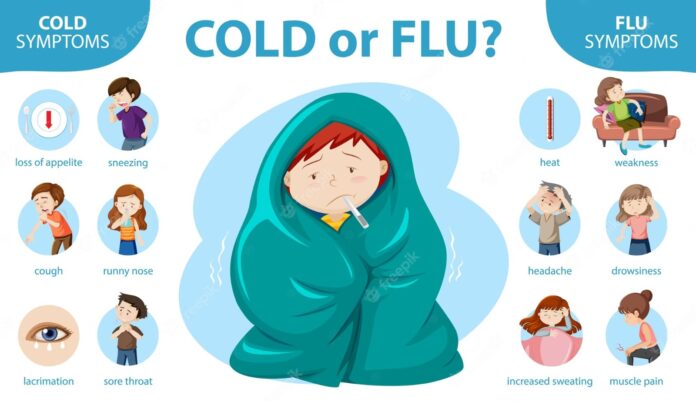Cold and flu are both respiratory illnesses caused by different viruses.
The common cold is usually caused by a rhinovirus, while the flu is caused by the influenza virus. Both viruses are contagious and can be spread through respiratory secretions from infected individuals, such as coughing or sneezing.
Symptoms of the common cold may include a runny or stuffy nose, sore throat, cough, congestion, and sometimes a low-grade fever. These symptoms usually develop gradually and can last for up to two weeks.
Flu symptoms can be more severe and may include fever, headache, muscle aches, chills, fatigue, cough, and sore throat. Unlike a cold, the flu often develops suddenly and can last for several days to a week or more.
Treatment for cold and flu generally involves managing symptoms with over-the-counter medications such as pain relievers, cough suppressants, and decongestants. It is also important to stay hydrated and get plenty of rest. In some cases, antiviral medication may be prescribed for the flu.
Prevention methods include practicing good hygiene such as washing your hands frequently, avoiding close contact with sick individuals, and getting an annual flu vaccine.
Cold and flu are both respiratory illnesses caused by different viruses and have similar symptoms. However, flu symptoms tend to be more severe than cold symptoms. Here are the symptoms and treatment options for cold and flu:
Cold Symptoms:
- Runny or stuffy nose
- Sore throat
- Cough
- Congestion
- Mild headache
- Sneezing
- Mild body aches
- Mild fatigue
Flu Symptoms:
- Fever (often high)
- Headache
- Muscle aches and body aches
- Fatigue and weakness
- Chills and sweats
- Dry cough
- Sore throat
Treatment options for cold and flu include:
- Rest: Get plenty of rest and sleep to help your body fight the illness.
- Hydration: Drink plenty of fluids, such as water, tea, and soup, to stay hydrated and help loosen mucus.
- Over-the-counter medications: Pain relievers, decongestants, and cough suppressants can help manage symptoms, but be sure to follow the directions on the package and check with your healthcare provider if you have any concerns or medical conditions.
- Antiviral medications: If you have the flu, your healthcare provider may prescribe antiviral medications to shorten the duration and severity of your illness. These medications work best if started within the first 48 hours of symptom onset.
- Home remedies: Warm saltwater gargles, steam inhalation, and nasal saline drops can help relieve cold and flu symptoms.
It is important to note that antibiotics are not effective against viral infections such as cold and flu. Additionally, if you experience severe symptoms or have underlying health conditions, it is important to consult with a healthcare provider for appropriate diagnosis and treatment.
Prevention is key in avoiding cold and flu. Simple precautions such as washing your hands frequently, avoiding close contact with sick individuals, and getting an annual flu vaccine can help prevent the spread of these illnesses.








































